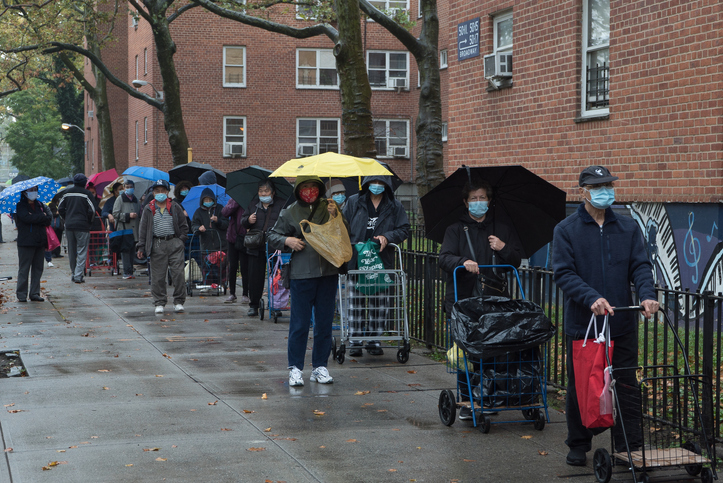The COVID-19 pandemic has not only revealed longstanding systemic challenges; it has also opened up enormous opportunities to advance structural change. The multiple crises facing workers and communities have provided organizers and advocates with opportunities to take bold leaps forward on issues and strategies — from essential workers to care policies, from racial justice and community safety to voter suppression, and from bargaining rights to corporate accountability. The crises wrought by COVID have also created openings for many of us within philanthropy to develop relationships and collaborations across diverse grantmakers and donors to meet the moment we are in.
Donors and funders sometimes hold a scarcity orientation, but the bold leaps necessary to meet this moment require new and more resourcing. Too often, movement organizations are expected to make transformative change without the full resourcing they need. Even prior to the economic downturn, the funding landscape for worker movements, for instance, felt small in comparison to the growing and intersectional campaigns in the worker field. Philanthropy dedicated to worker’s rights has been shrinking in recent years while funding dedicated to related but different frameworks, such as the “future of work” and “upskilling,” have grown tremendously. A critical question for the field is how to meet the growing needs of our grantee partners and social movement leaders — and acknowledge the abundance of resources and opportunities within philanthropy that allow us to do so. It is critical for philanthropy and movement leaders to be intentional about how to create authentic spaces for joint analyses and feedback loops that ensure that there is alignment between movement needs and resourcing strategies.
My Ford colleagues and I grappled with this challenge at the start of the pandemic, as we took stock of the growing needs of our grantee partners. It feels natural in moments of crisis to consolidate and deepen existing relationships with allies and partners. However, the scope and scale of this economic crisis revealed the need to build beyond our existing relationships to find new partnerships that could mobilize additional resources to grassroots organizations and policy advocates. Through discussions with movement partners, we learned that new resources were necessary to help them respond to the immediate crises their members and communities were facing while building towards an equitable and just economic recovery. Just as movement leaders and organizers are building across issue silos, philanthropists must also collaborate across foundations to fund social movements at the scale necessary to effect real change.
One such example of a collaboration among diverse donors is the Families and Workers Fund, which was launched in April 2020 as the first multi-donor pooled fund dedicated to the economic crisis caused by COVID-19. The Fund was designed both to tackle the immediate need for cash assistance and to enact the structural change necessary for workers and their families to experience an equitable recovery.
With an initial commitment of $7 million, the Families and Workers Fund now stands at $38 million and growing. About half of this funding comes from foundations that have never before supported worker issues. To grow the fund, my colleagues and I did intentional outreach to funders who are not in the worker and economic justice space, approaching funders who work on issues of economic opportunity but through different vantage points. We knew that economic opportunity philanthropy can sometimes be siloed: the policy and advocacy funders might be in one corner, the workforce development and skills training funders in the other, and tech and future of work funders in another still. In this moment of profound crisis, we wanted to create a nimble, quick way to do joint grant making and analyze the latest needs on the ground together. We also knew there were a few other philanthropists who do not typically fund organizing or advocacy but wanted to provide support and relief as this crisis grew. In the end, the Fund brought together social justice funders like Open Society Foundations, corporate funders like Morgan Stanley Foundation, tech funders like Eric and Wendy Schmidt Futures, and high net worth individuals like Abigail Disney. The collaborative is fiscally sponsored by the Amalgamated Foundation, the sister philanthropic arm of Amalgamated Bank.
The Fund became a vehicle for exposing one another to new ways of thinking about economic and worker issues and to broaden our understanding of the field of organizations addressing these challenges. It also served as an important way for individuals across foundations to build relationships that have helped seed new opportunities beyond the work of the Fund. For example, colleagues at Schmidt Futures have provided incredible insight into the highly technical reasons why unemployment insurance failed so many workers during the crisis, especially workers of color. We are now working to bring together leaders working on unemployment insurance policy reform with those working to fix technology systems. We have developed an understanding that we need policies that center equity and we need to invest in the fine details of delivery — too often philanthropy invests in one camp or the other, not both.
The power of deep, intentional, and open collaboration showed. In 2020, the Fund made grants to 44 organizations on the front lines of the economic crisis caused by COVID-19, including National Day Laborers Organizing Network, UNITE HERE Education and Support Fund, and Mission Asset Fund, as well as smaller or regional organizations in especially hard-hit places like Puerto Rico and Arizona. Together, these organizations got cash relief to 215,000 of the hardest-hit workers and families, most of whom were either formally excluded from the social safety net or faced huge barriers to accessing it. The Fund also supported a handful of policy organizations, including CLASP and NELP, that quickly surged to support frontline organizations or to shape relief policy development so that it centered working people and families. These groups were successful in paving the way for an equitable and comprehensive rollout of the country’s first-ever federal paid sick days policy at the state and local levels, and research and data that helped make the case to policymakers for expanded unemployment insurance. Today, the Families and Workers Fund has transitioned from a rapid response fund dedicated to the economic fallout caused by COVID-19 to a five-year funder collaborative that aims to help shape a more equitable recovery through fostering high-quality job growth and helping to transform the benefits system, with a focus on unemployment insurance.
The Fund has not only created space for collaboration among donors; it has also allowed donors to learn from and partner with organizers and leaders. Through learning calls and deep consultation with organizers, donors are able to gain a more nuanced understanding of the challenges and needs. For example, some organizations needed technical support to set up cash assistance programs. Through the Fund, we were able to connect grantee partners to technical assistance resources, in addition to the grant dollars.
Ford has been part of building a similar effort at the global level — the Response and Vision Fund, which is an initiative of the Funders Organized for Rights in the Global Economy (FORGE) collaborative. FORGE brings together funders focused on natural resources and climate change, labor rights, migrant rights, women’s rights, human rights, and corporate accountability – enabling exploration of how these issues intersect with one another to support reforms that are grounded in the rights and power of communities and workers, strengthen accountability, and seek to address underlying flaws in the financial system.
These collaborative funds have created rare and crucial spaces for learning and developing shared analyses among funders; for some, they’ve also provided a real entry point to the issues and organizations in the worker and economic justice arena. As a result, the crisis has expanded the table of funders who want to support workers, economic recovery, and power building — and helped model new relationships for future efforts.
Having shared some of the benefits of collaborative funds, there are limits and challenges as well — namely, time, effort, trust, and commitment. Putting money in a collective pot and doing grant making together requires a different level of alignment and partnership that philanthropy often demands of grantees but not of itself. This type of alignment can take a lot of time and effort. Building the structure while doing the work is key to helping to develop shared experiences that can strengthen relationships and the work itself. This requires a core set of committed partners who will provide real sweat equity. If the collaboration involves partners who do not have an experience of working together, it is necessary to establish practices and norms that create space for trust building and dialogue across diverse perspectives and ways to manage the differences, so as not to be paralyzed by them.
Over the last year, I’ve witnessed the power and impact of collaborations among different donors. Upon reflecting on the experiences of standing these collaborations up, I am reminded of some important lessons that have been guides for me throughout my tenure as an organizer and funder: always create entry points for people to join and to build with you; seek opportunities to deepen our existing base and partnerships; and build new relationships that expand our collective thinking, strategies, tools, and sphere of influence.
Collaborative funds and other efforts like this get us closer to recognizing the abundance of resources and what is possible when we pool them to fund organizations at scale. We should not only resource and position organizing and movement organizations to take the bold leaps that are required at this moment but also expand the table to invite and include other donors to join in supporting workers, families, and an economy that we can all thrive in.

